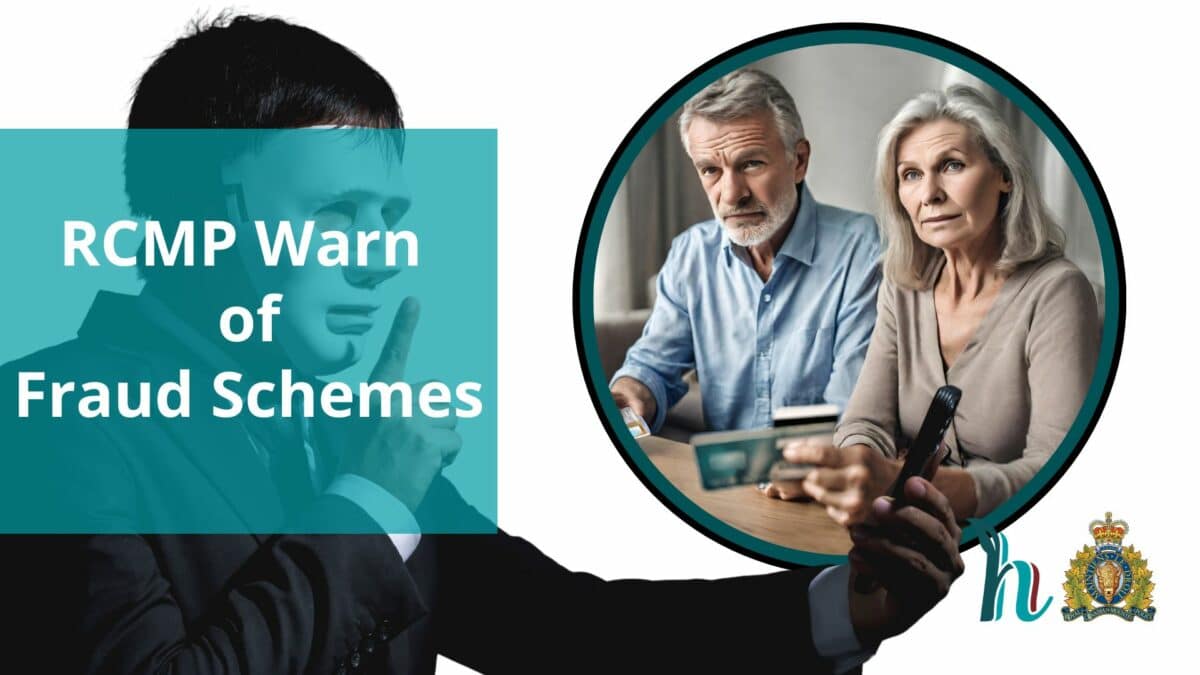
The Hanna Detachment has received reports of some common fraud schemes.
Submitted by Sergeant Rob Welsman, Hanna Detachment.
Reports of fraud and attempted fraud are not uncommon at the Hanna detachment. Sgt. Welsman has provided some common examples so that Hanna and area citizens and your loved ones can avoid being victimized by these scams.
Phishing and Smishing Scams
Every one of us has likely received a text message at some point asking us to either log into a bank account (at a bank you may not even use) or that your package is currently held up in the mail and needs your attention (even though you didn’t even order anything). You may have also received text messages that the Canada Revenue Agency owes you a tax return. These are common examples of fishing for personal information via sms text message, also known as “smishing”. Scammers will send these text messages to a large number of cell phone numbers in the hopes that at least a few of the recipients will click on the links in the message they have received. These links take the victim to a website that may appear legitimate but is fake, and is designed to collect the bank card numbers, passwords, or other login data that the victim inputs when they try to log into the fake website. Phishing is a similar scam, except that it occurs via emails that the victim may receive. Never utilize website links from unsolicited text messages and email.
Romance and Friendship Scams
From time to time Hanna RCMP receive complaints directly from victims who are preyed upon in romance and friendship scams, but frequently the complaint comes from a concerned family member or friend of the victim. In these types of scams, the victim may be contacted by a stranger, often via social media, who strikes up a conversation with the victim and gradually forms an online friendship or romantic relationship with the victim. Inevitably though, the scammer will eventually ask for money, typically using a time-sensitive excuse. A common example is that they need money for a plane ticket or gas money to come visit the victim. The scammer may also say that they need money to settle a business problem or settle an urgent debt, like unpaid rent. Unfortunately, victims often provide these individuals with money, even though they have never met in person. If the victim provides money, the scammer will come up with new reasons why they need even more money. Because the money is provided willingly, banks will not reimburse victims in these situations. In cases where these scams are reported by the victim’s friend or family member(s) to the police, it can be difficult to convince the victim that they are being scammed.
Online Purchase Scams
Another common scam that is reported to the Hanna Detachment are situations in which a victim observes a listing for an item for sale on social media, like Facebook Marketplace, or a website such as E-Bay or Kijiji. The scammer posts an item, which they likely do not even have, with an attractive price. To make the item appear more legitimate, the scammer may use a fake social media profile that shows a location that is local to the victim. The scammer will then ask for a deposit or payment in full from the victim, often by e-transfer or other electronic means like gift card codes (more on that later), and then the victim will never hear from the scammer again. Banks may attempt to assist in the cancellation of an e-transfer however, the money is often deposited and removed from the receiving account quickly by the scammer. Although these platforms provide a convenient way to find goods and services, the money and the item(s) should only be transferred in person.
Investment and Crypto-Currency Scams
Typically these scams begin when the victim observes an advertisement on the internet that suggests that there is a big investment opportunity that the victim should enter into (Crypto-currency and A.I. are currently popular themes). These ads may appear on social media, traditional websites, or as video ads in YouTube videos. The victim is then led to a website that gets them to create an account on an outright fake or unregulated financial trading platform and may require the victim to utilize Bitcoin or other crypto-currencies to provide funding to their account. The scammer(s) then indicate that the victim’s money will be placed into investments, which then appear to be making large amounts of money. This often causes the victim to ‘invest’ more of their money, and eventually, the website and scammers take the money and run.
Individuals wanting to invest should only utilize the services of a financial institution recognized by the Office of the Superintendent of Financial Institutions of the Government of Canada.
Gift Card Payment Scams
By far the most common scam is those in which the scammer will direct the victim to pay them using gift card codes. This may begin with a simple phone call. Scam storylines commonly used may vary, but a common one is when the victim receives a phone call from someone pretending to be a person of authority, such as the Canada Revenue Agency or a police agency. In the case of the CRA scam, the scammer says that the victim owes money to the CRA, and that if they fail to pay, there could be penalties including jail.
Another example is where the scammer pretends to be from a business, bank, or other institution and wants to enlist the victim’s assistance in the investigation. The scammer will tell the victim to buy one or more gift cards from a local retailer and to provide the code numbers on those gift cards to the scammer. Once those code numbers are given, the scammer will then use them to make purchases. For this reason, the scammer will usually request gift cards from online retailers that can be used worldwide, such as Amazon, Apple, or Home Depot, or they will request Visa Gift Cards, which can be used at any retailer.
What to do if Victimized
If you have been victimized in fraud, contact the Hanna Detachment at 403-854-3393, and your banking institution immediately. It may be possible to take measures that will prevent further loss, or in some cases recover the funds. Investigating officers will be able to determine if there are investigative avenues that would lead to identifying the perpetrator(s). If you know someone you believe has been victimized in a fraud, encourage them to contact their local police.

